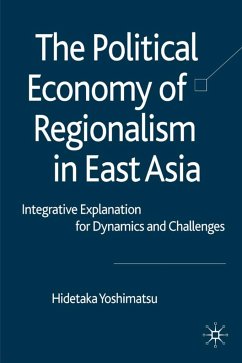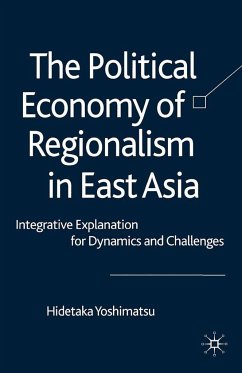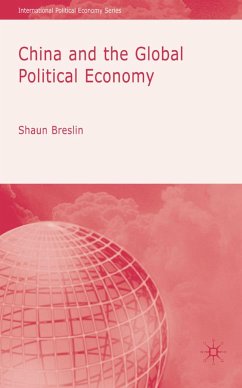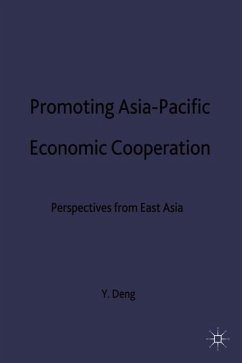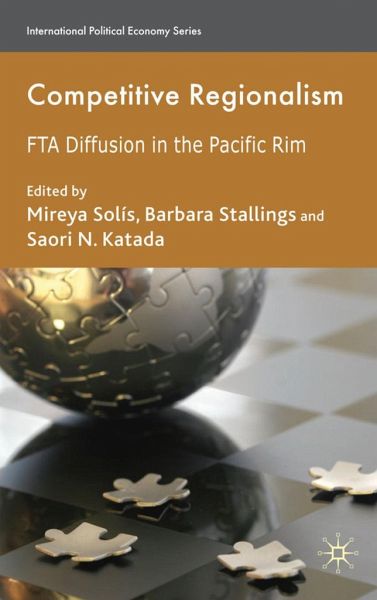
Gebundenes Buch
Competitive Regionalism
FTA Diffusion in the Pacific Rim
Herausgegeben: Solís, M.; Stallings, B.; Katada, S.
Versandkostenfrei!
Versandfertig in 6-10 Tagen

PAYBACK Punkte
19 °P sammeln!





Despite abundant scepticism about their economic benefits, Free Trade Agreements (FTAs) have proliferated at a rapid pace. Policy diffusion models explain how different sets of preferential trade agreements are interconnected and establish under what conditions FTAs can work for or against the emergence of coherent regional blocs.
MIREYA SOL?S is Associate Professor at the School of International Service of American University, Washington D.C., USA. She is the author of Banking on Multinationals (2004) and co-editor of Cross-Regional Trade Agreements (2008). BARBARA STALLINGS is William R. Rhodes Research Professor at the Watson Institute for International Studies, Brown University, Providence, USA, and editor of Studies in Comparative International Development. Previously, she was Director or the Economic Development Division, United Nations Economic Commission for Latin America and the Caribbean, and Professor of Political Economy, University of Wisconsin, USA. Her most recent book is Finance for Development: Latin America in Comparitive Perspective. SAORI N. KATADA is Associate Professor at the School of International Relations, University of Southern California, USA. Her book Banking on Stability: Japan and the Cross-Pacific dynamics of International Financial Crisis Management (2001) has received a Masayoshi Ohira Memorial Book Award.
Produktdetails
- International Political Economy Series
- Verlag: Palgrave Macmillan / Palgrave Macmillan UK / Springer Palgrave Macmillan
- Artikelnr. des Verlages: 978-0-230-57778-7
- 2009 edition
- Seitenzahl: 289
- Erscheinungstermin: 8. Juli 2009
- Englisch
- Abmessung: 216mm x 137mm x 23mm
- Gewicht: 505g
- ISBN-13: 9780230577787
- ISBN-10: 0230577784
- Artikelnr.: 27347145
Herstellerkennzeichnung
Libri GmbH
Europaallee 1
36244 Bad Hersfeld
gpsr@libri.de
'The dominant recent development in global trade policy has been the explosive growth of bilateral and regional free trade areas. This excellent volume brings together academic talent from around the Pacific Rim to explore complex and varied issues involved in the evolving policies of individual countries and how they fit together. Bravo for a job well done!' - Edward Lincoln, Director, Centre for Japan-US Business and Economic Studies, New York University, USA
'Why have free trade agreements proliferated at an unprecedented rate since the World Trade Organization was established? Solis, Stallings and Katada and their contributors seek to answer this important question in this theoretically sophisticated volume. A must read for anyone interested in the current evolution of the global trade system.' - John Ravenhill, Australian National University, Australia
'In this persuasive book the authors make a major contribution to the understanding of our global political economy. Skillfully combining sustained theoretical ideas and empirical analyses, the work underlines the strategic interaction explaining the race to free trade agreements. A collection of persuasive research that breaks away from conventional thinking.' - Diana Tussie, FLACSO, Argentina
'Why have free trade agreements proliferated at an unprecedented rate since the World Trade Organization was established? Solis, Stallings and Katada and their contributors seek to answer this important question in this theoretically sophisticated volume. A must read for anyone interested in the current evolution of the global trade system.' - John Ravenhill, Australian National University, Australia
'In this persuasive book the authors make a major contribution to the understanding of our global political economy. Skillfully combining sustained theoretical ideas and empirical analyses, the work underlines the strategic interaction explaining the race to free trade agreements. A collection of persuasive research that breaks away from conventional thinking.' - Diana Tussie, FLACSO, Argentina
Für dieses Produkt wurde noch keine Bewertung abgegeben. Wir würden uns sehr freuen, wenn du die erste Bewertung schreibst!
Eine Bewertung schreiben
Eine Bewertung schreiben
Andere Kunden interessierten sich für




